After staying clean from illicit drugs for three years, Stephanie Creighton found herself in a familiar situation—on the streets of Springfield, Missouri, in the middle of winter.
“I can’t do this. I’m not able to live outside again without doing drugs,” Creighton recalled telling herself.
In desperation, she called a woman she knew at a local nonprofit group that served the homeless population. “I decided: I’m just going to give it to God,” Creighton told The Roys Report (TRR) through tears. “They called us back that evening and told us that they would give us a chance.”
Eden Village, a local gated community of low-rent “tiny homes,” gave Creighton and her husband, Daniel, that chance in December 2018. And the ministry’s unique model, which aims to end homelessness, is spreading nationwide.
“It’s unbelievable that, here in America, people are sleeping outside in situations uninhabitable for human beings,” said Nate Schlueter, chief visionary officer for Eden Village USA. “For people moving off the streets who don’t have much stuff, what they need is a small home that’s up to code and fully furnished. We settle them in one at an affordable rental rate.”
Your tax-deductible gift helps our journalists report the truth and hold Christian leaders and organizations accountable. Give a gift of $30 or more to The Roys Report this month, and you will receive a copy of “Hurt and Healed by the Church” by Ryan George. To donate, click here.
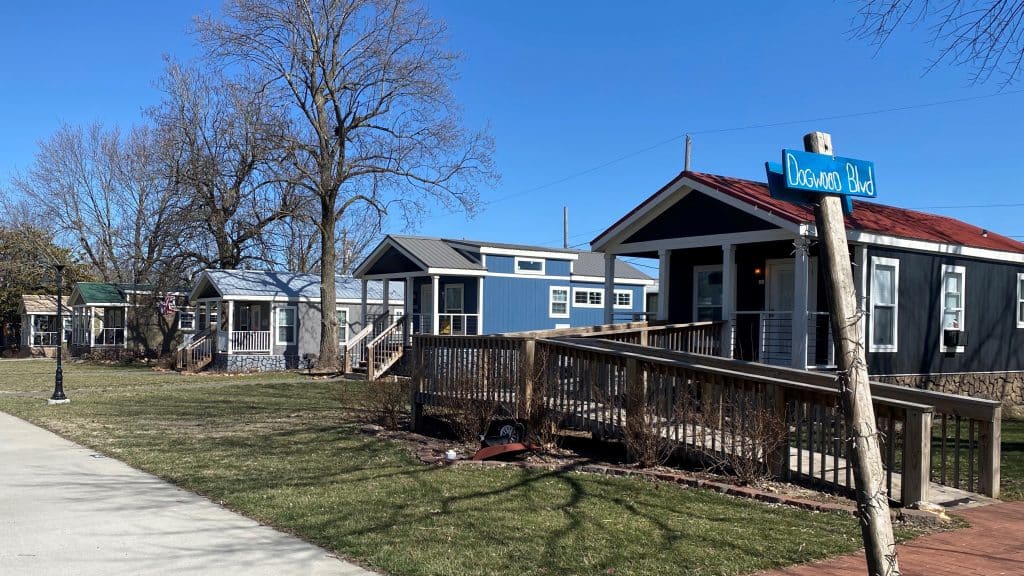
Since opening in summer 2018, Eden Village communities have saved formerly homeless people from “over 40,000 nights” outside on the streets, the group reports. Three “tiny home” villages are open currently—two in Springfield and one in Wilmington, North Carolina.
The Eden Village model has been pioneered by faith-based nonprofit group The Gathering Tree, founded in 2010 by local realtor Linda Brown and her husband, David. While the team behind Eden Village profess Christian faith, leaders say a diversity of community groups back the project.
“We’re very much driven by our faith in God, no apologies,” says Schlueter. “But if that’s not your belief system, we can still work together to bring homeless people home.”
A safe community where lives are rebuilt
In December, the U.S. Department of Housing and Urban Development reported that the problem of homelessness has increased about 1% over the past year. Other thorough reporting of the issue has been interrupted by COVID protocols but shows increasing needs.
A first-of-its-kind model, Eden Village seeks to balance safety and social needs in its approach to the problem. Dozens of 400-square-foot homes are situated around a community center, which hosts activities and classes to help people navigate out of homelessness.
Each home also includes a front porch, where neighbors convene and get to know each other. “It brings you together,” said Creighton about the community design. “I love welcoming new people in. You feel like a family because you’ve been through it together, and now you’re coming out of it together.”
All residents must enter through a secure entry, and vehicles are kept outside the community in a central lot. Creighton said she supports the safety policies. “They don’t allow just anybody to come in here,” she said. “Some people have said, ‘Oh, it’s like a prison.’ But you have a choice whether you want to be here or not.”
The Creightons, who are parents of five and grandparents of 13, struggled during their nine years experiencing homelessness to maintain employment. “Daniel was turned down for a lot of jobs because he didn’t have a home address,” said Stephanie, now 48. “And it’s really hard to hold down a job when you have a drug addiction.”
Since becoming an Eden Village resident, he has been hired by a local construction company.
Expanding to Tulsa
According to Schlueter, “about a dozen” Eden Village communities are in the process of launching—notably one in Tulsa, Oklahoma.
Retired local businessman Brad Johnson says he has spent the past two years volunteering with local organizations to understand how to best serve the homeless population.
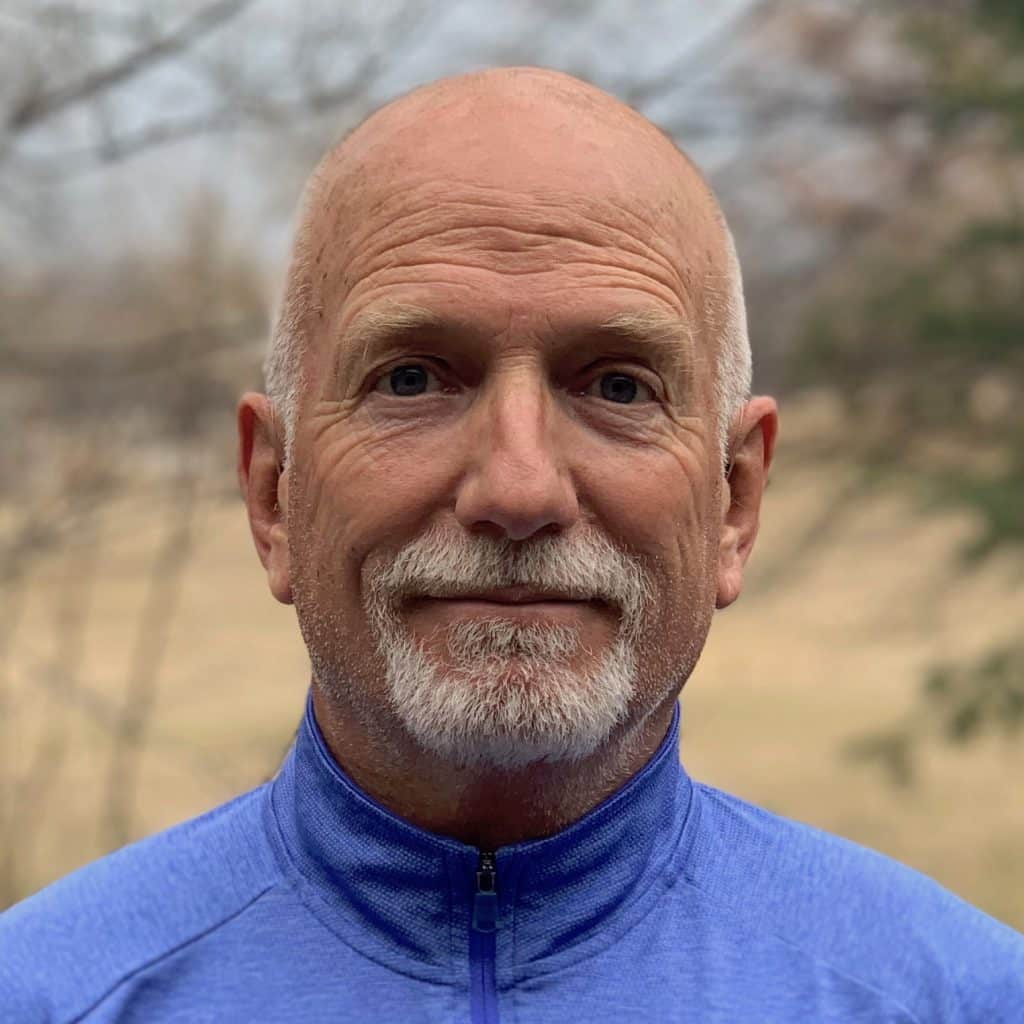
“The problem is growing exponentially,” he told TRR. “As more people are living on the streets in tents, some drastic steps have to be taken. I’m just a guy who’s trying to do his part to gather a team and do something that will help in this battle.”
Only months ago, in his annual “State of the City” address, Tulsa mayor G.T. Bynum listed the issue of homelessness as one of Tulsa’s greatest challenges.
He announced a goal of raising $500 million in “housing investment across the city,” with an emphasis on “private sector” involvement. “We hope that our faith, philanthropic, health care, and business communities will help achieve this,” said Bynum.
Johnson, who has spearheaded the launch of Eden Village Tulsa for over a year, said their project answers that call. “Anybody working with this population will tell you that the weak link is permanent supported housing,” he said. “For the chronically homeless, the people who have the most needs, they have very few options right now.”
The website of Eden Village USA underlines that target audience, that a resident must qualify as “chronically homeless and has a physical/ mental disability.”
“A disability is not always a physical handicap,” explains Schlueter. “For 80% of our residents, the primary disability they would cite is a mental health condition. When you’ve been on the streets for so long, it’s inevitable that you’ve got some anxiety, depression, or similar issues.”
Upholding the dignity of every person
In Tulsa, the ministry’s locally-led initiative has purchased a 17-acre plot which is already being cleared.
Johnson cites several Tulsa churches—including South Tulsa Baptist Church, Christ the Redeemer Lutheran Church, Abiding Harvest Church, and Harvard Ave. Christian Church—as core partners.
In Tulsa, as with other Eden Village communities nationwide, discussions are ongoing with many other congregations and local businesses about helping sponsor their city’s initiative.

On April 18, nonprofit, church and civic leaders will gather in Springfield for a two-day Eden Village conference where leaders discuss practical aspects and consult one-on-one. “We’ve got about 25 communities coming so far in April,” said Schlueter.
Yet the faith affiliation of leaders has raised questions about whether religion is forced on residents—which the ministry spokesman agreed is a fair inquiry.
“The ways that faith organizations in the U.S. address poverty have often been problematic,” he said. “Sometimes we ask people with less than us to do something that we don’t have to do, like (mandating they) go to two Bible studies a week.”
Eden Village communities offer what he calls “biblically based addiction recovery classes” along with art classes, game nights, and other social activities. But he says participation is voluntary.
Creighton, a resident for four years and herself a Christian believer, confirms this. “I don’t feel like they’ve ever tried to shove religion down my throat or anyone’s—they’re very respectful.”
She said being afforded dignity has defined her experience at Eden Village.
“They definitely made me feel that I am somebody, that I’m worth them giving me a try.”
 Freelance journalist Josh Shepherd writes on faith, culture, and public policy for several media outlets. He and his wife live in the Washington, D.C. area with their two children.
Freelance journalist Josh Shepherd writes on faith, culture, and public policy for several media outlets. He and his wife live in the Washington, D.C. area with their two children.




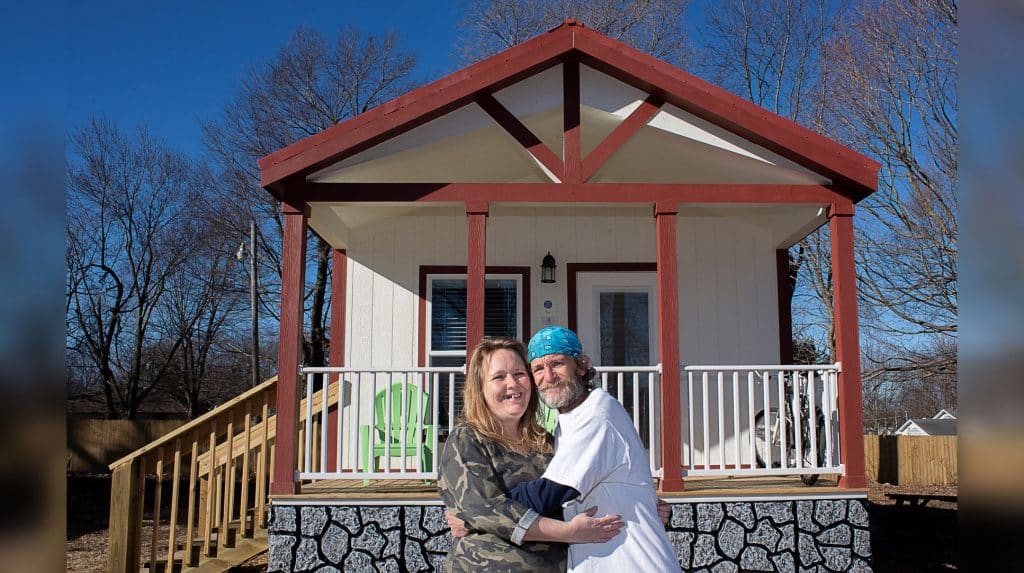

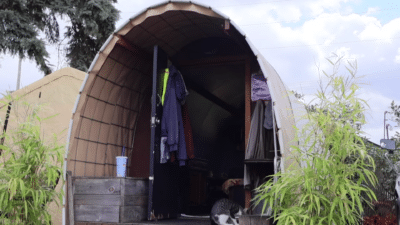
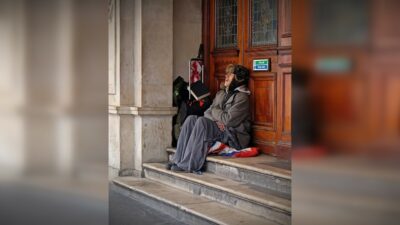












23 Responses
Home Again Foundation of Charlotte is building similar communities.
This is great God bless you ..I’m in Michigan and is homeless as of 03-03-23
Best wishes for finding shelter soon.
yet another effort that completely misunderstands the problem. the problems of the homeless are NOT that they don’t have a home but that they are drug addicted. yes there are some folks down and out but there are resources to help them. the vast overwhelming cause and reason why people are homeless is drugs. building tiny homes is great for the few people it will help but it can never solve the actual problem. the only way to solve the problem is to start by enforcing the law. no one has a right to live on the street and it is not compassionate to enable the behavior. the homeless need to go to a shelter, jail or drug rehab, but staying on the streets should not be an option.
Jesus fed people, and this is awesome and good news! I am thrilled to see communities where people can be helped and can have the support they need to thrive. Jesus came to give life and breathe life into those who need it. Encouraging and exciting news in a world that has, in many ways, gone dark. This is light in a weary world.
I do agree. The “free” that people are going to receive is not a happy cure. Not a cure at all! Giving to some that just don’t want to work, or provide for them selves will be abuse. Pretty soon all will take a house for free.
And I pray the homeless have a relationship with the Lord in the name of Jesus
I don’t do drugs. I had a crisis in my family ..and now I’m just trying to deal with it in life
Wrong on so many levels….
Look into how Portugal has addressed their drug abuse issues and the results that have followed.
Dear Mr. Witt,
The problems of the homeless are MANY, drug addiction alone is not the root cause. Some , not all homeless folk use alcohol or drugs to self medicate their mental health conditions. Before you declare drugs as as the vast overwhelming cause of those who are homeless, consider that drugs of any kind cost money, something the homeless person is not accustomed to having on a daily basis. Yes , some homeless people get involved in alcohol & illict drugs but as many as you think. I personally guarantee that if you take the time to volunteer at a homeless shelter or serve in a meal program your heart and mind will be changed forever. Shelters , rehab programs and even jail are used to help people who suffer become healthy. They are not intended to be used as a punitive tool to remove them from our sight so that we are comfortable. If your municipality has a ride along program with the law enforcement, ride along with them for a few hours on any shift.You will be glad you did, you will see people at their worst while simultaneously see people in need of other humans lending a hand to help them regain their dignity, to live another day in a healthy state of mind.
On the topic of living on the street, I don’t know of any federal, state, county or local laws compelling us to live in a house.
It is compassionate though to be kind towards those in need.
Let’s start with USA Veterans. Everyone else comes after.
you obviously don’t or haven’t lived in a place where this is a real problem. i have. allowing this behavior destroys our cities and destroys the lives of those addicted and caught in this horrible life. yes, this is a drug problem. in many cities the homeless are given the opportunity to have a bed in a shelter but they almost always turn it down because they won’t live by the rules of no drugs or alcohol. it is NOT compassionate to enable people living on the streets. never has been and never will be. the compassionate thing is to get them off the street, even if they don’t want it. our large cities in america are now not livable except by the drug addicted homeless. they have become the cesspool of our country. until the leaders of our cities realize the actual solution the problem will only get worse.
“Retired local businessman Brad Johnson says he has spent the past two years volunteering with local organizations to understand how to best serve the homeless population. ”
Perhaps you need to allow for the fact that other people who have explored the issue in depth have come to dramatically different conclusions?
“yes, this is a drug problem.”
Have you actually tried to talk to any of these people to find out their story of how they ended up in their current situation and what help they need to get out of it?
I agree. I have 2 family members that are homeless and addicted. My family has tried to help them several times and all they want is a handout. These two were brought up completely different than how they live now and quite honestly are an embarrassment. I don’t care if they NOW have trauma from being homeless so long, that’s on them. I sure as heck DON’T want to pay for a bunch of homeless drug addicts, qualifying for disability, with my taxes. It’s a shame they can’t be forced into rehabilitation but, that will never happen, at least not in my lifetime. There are a small percentage of homeless people WILLING to change their lives, the rest are just takers.
I think for larger areas with many homeless for whatever reasons, a large motel by the city would be a good idea. In return the individuals would work 3 hours a day at a 5 day week making an equivalent of 25. an hour not in cash but a pool for living expenses , food and about a 130 a month for clothes ,in line with donation stores, pantries and anyone else, the rest would go back towards the building too the city, a geometry of a circle, not the one it is today. Parks would be clean ect. , not taking jobs from others but maintaining while regular crews could perform other tasks. And a common kitchen while some would make meals. Believe the city after living and such expenses would net 150,000 – 175,000 a year.
look at cities where the homeless are given hotel room and see what happens (this has been tried many times). they destroy the hotel rooms. no, giving drug addicts a motel room will not improve anything.
This strikes me as an excellent initiative, something that actually helps, at least can help many people. The security of the tiny community model would reduce the chance of it becoming a tent city. While homelessness is a complex issue, the tiny homes project certainly helps.
– Greg
It’s great that there’s hope for the homelessness, and hopefully they can get back up and get into the working world because after all, that’s the objective. That they sustain themselves. May the Lord bless them in the name of Jesus.
Please help us in Detroit Michigan
Jacquelynn T,
How can we help? What kind of assistance are you looking for?
I find it FASCINATING that in the USA culture that “Tiny Houses” are now being used as a back door to the same arrogant opulence that is force-fed (and gobbled down) by the masses.
“Tiny Homes” are just that: small structures that people live in. Nothing more. They are also ILLEGAL in the VAST MAJORITY of the USA where you could easily legally build a 2500sft “home”.
How convenient to lovingly stigmatize a HOUSE, or people who CHOOSE to live within their means, or, perhaps, not creat a “footprint” that requires FIVE PLANETS to sustain.